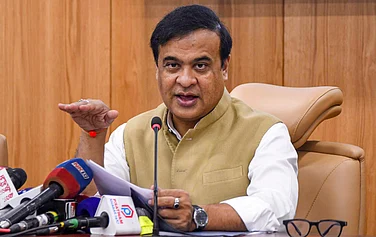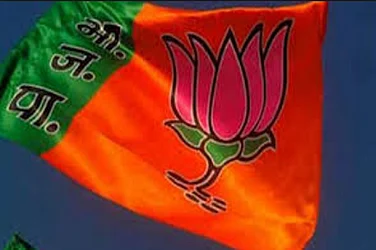THAT the BJP recognised that it had a battle on its hands to retain its stronghold of Delhi in the forthcoming assembly elections was clear when the party dumped Sahib Singh Verma in favour of Sushma Swaraj a month ago. And the developments over the past week have, to the party thinktank's lasting grief, have only shown how right they were.
To be sure, the BJP's list of woes has only increased: insinuations about Sahib Singh Verma's involvement in the murder of BJP rebel and Samata candidate Ved Singh in Verma's home village of Mundka; former chief minister Madan Lal Khurana's at best ambivalent attitude towards this crucial electoral test; rampant and virulent factionalism; the sustained price rise; and the ubiquitous anti-incumbency factor.
"It is now a battle for survival; you cannot contemplate the disaster for the party if we lose Delhi," admits a former Delhi BJP office-bearer who has been involved with the party's Delhi unit for over two decades. The reasons are not far to seek. The party wrested 49 out of the 70 seats in the 1993 assembly elections and in the 1998 Lok Sabha polls it garnered a whopping 51 per cent of the votes polled. A committed cadre ELECTIONS with mohalla-level networks D E L H I all over the city and strong support among the middle class, traders, businessmen and the post-Partition refugee community have so far made the party virtually invincible. It is this pride which is at stake.
Conventional wisdom among activists of various political hues, however, has it that the BJP still retains an edge—albeit a very slender one—and that it would need a massive erosion of support for it to end up losing the election. It is telling that most observers believe that the BJP faces a challenge not from the principal opposition party, a listless Congress, but from its own propensity to blunder.
Perhaps the best indicator of the mounting troubles for the BJP is the attitude of former chief minister Khurana, the man who has been central in the project of converting Delhi from a broadly pro-Congress city to a hardcore BJP stronghold. Addressing a meeting of supporters on November 11, he dropped a bombshell: "This may be the last election in which I am participating." This, a day after Khurana, still smarting over the BJP leadership reneging on its promise of installing him as chief minister, said of the murder at Mundka: "It is not surprising considering the kind of elements who have been encouraged over the past few years." That Khurana is yet to begin campaigning for the party—despite 50 very worried candidates petitioning him to help them out—is proof of his "disgust" at the BJP.
Undeterred, Sangh Parivar sympathisers have been working overtime to "involve the community" through religious functions such as 'jagrans' in umpteen neighbourhoods. While mention of the Pokhran blasts is de rigueur for all candidates, there is a parallel sotto voce Sonia versus Saraswati campaign. Still, the BJP rank and file is worried about the danger of falling between two stools in the crucial Outer Delhi parliamentary constituency which has 21 assembly seats (the BJP had won 15 seats from here in 1993). For, after the Mundka murder, Sahib Singh's always questionable ability to deliver these votes stands further eroded.
The committed support to the BJP and its ideology, which Sushma Swaraj had spoken of when she took over last month, is what the telegenic CM is now depending on to pull her through. But the unprecedented hike in prices of vegetables, oil and other essentials is showing signs of denting the economically lower strata of even this solid votebank. BJP strategists had been keen to convert the Delhi elections into a Sushma versus Sheila (Dixit) battle in the hope that the former's undoubted charisma would deflect attention from issues such as the price rise. But now, even they are now ruefully admitting that the Delhi Congress president's refusal to play ball has messed up this plan.
In fact, as Outlook found out after following the Swaraj campaign trail, the one thing the chief minister is having to spend the major portion of her speeches on is defending the inability to control prices—both at the Centre and state level. Take, for example, her speech in the Sarojini Nagar area: "People of Sarojini Nagar are an educated lot. You should not fall prey to the conspiracy hatched by the Congress on the prices issue. The Congress was behind the dropsy epidemic and the salt scarcity scare...onion prices are high all over the country due to natural causes."
BJP sources admit that the other problem for Swaraj is that she cannot really pitch this election as a vote on five years of BJP rule in Delhi too strongly (despite the mandatory references to how well the Delhi government has performed) because that provides the opposition far too many openings: three chief ministers in a span of five years, still no full statehood for Delhi, plus the prices. It is a pithy comment on the state of affairs in the Delhi BJP that Sushma has had to resort to banking on A.B. Vajpayee's appeal, even if it is showing signs of fading: "This is not only an election for the Delhi assembly but a chance to strengthen Vajpayee's hands."
In the East Delhi parliamentary constituency area, which has 20 assembly segments and which together with Outer Delhi will decide the winners of this election, the price rise will again play a major role. An erstwhile Congress bastion, this area has the largest concentration of slum clusters in the capital and there is a great deal of resentment at the escalating cost of living. But all of this will only chip away at the peripheral BJP support base, which depends upon the perceived vigour and performance of the party; the core remains loyal. The Congress, on the other hand, seems content to get its nose in front by default. Congress leaders note that "despite winning only one seat in the 1998 parliamentary polls, our vote share went up to 43 per cent from 34.5 per cent in the 1993 assembly polls. We are catching up." With the Janata Dal more or less finished as a political entity in Delhi, the Congress is hoping to pick up those votes as well. Hopes are also pinned on the informal tie-up with the BSP (the party is supporting Congress candidates wherever it has not put up any of its own).
But the Congress has far too many troubles of its own to try and mount an aggressive campaign. The Sikh community is infuriated that the '84 riots accused, including Sajjan Kumar, H.K.L. Bhagat and Jagdish Tytler, have been given place of pride in the Congress campaign committee. Besides, there is no leader of stature with roots in Delhi and the BJP has found a ready constituency among a large section of the middle class, pushing them beyond the pale of Congress influence.
Which is why the Congress really does not have an option but to let the BJP do the running—and, they hope, the stumbling. According to Dixit, "the BJP's non-peformance and the debilitating price rise will mean a victory for us but we will have to work hard; it will not come on a platter." A vast majority of her partymen seem to be hoping, however, that just standing on the sidelines and waiting to pick up the pieces will be enough "hard work".
The last week of campaigning before the November 25 polls is expected to see the bigwigs from both parties, including Vajpayee and Sonia Gandhi, try and blitz Delhi into voting for their respective parties. But unless there is a decisive shift in public mood, a close fight is very much on the cards.


























